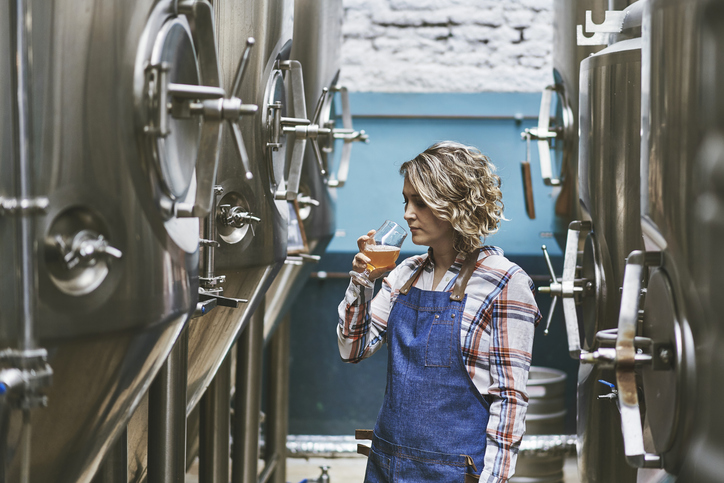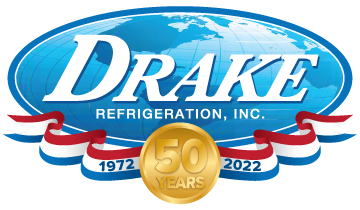
As we covered in a previous article on factors to consider in your brewery chiller selection, it’s critical to choose the right-sized system for your brewery’s unique needs. Too-small chillers can’t achieve desired glycol temperatures, and too-large ones can’t meet desired refrigerant requirements. Taking a just-right approach is the secret to keeping your brewing processes cool – and your brew flowing smoothly.
So, what’s the best-sized brewery chiller for you? Much of it comes down to these six calculations:
- Beer volume (BBL)
- Pull-down/crashing loads
- Active fermentation heat load
- Wort heat exchanger secondary heat load
- Brite tank holding load
- Heat loss compensation
Read more on these six calculations to determine the right-sized brewery chiller for your operation below.
Beer volume (BBL)
Calculating the size of your ideal brewery chiller starts with knowing the number of barrels (BBL) your brewery can produce at one time. This information is critical because it helps ensure your chiller can keep up with the production volume at your facility. For instance, if you can produce 20 beer barrels at a time, you would have a 20 BBL system. With 31 gallons in one BBL, multiplying 20 BBLs x 31 reveals your total volume in gallons:
20 BBL x 31 gallons/BBL = 620 total gallons
Pull-down/crashing loads
The next calculation in determining the right-sized brewery chiller is to evaluate the BTU/HR required for your brewery’s pull-down process. To do this, multiply your beer volume in gallons by 8.33 pounds to get the total pounds, multiply total pounds by the temperature differential, and divide by the hours of your pull down. Keeping with the previous example, if the temperature differential is 75°F – 34°F = 41°F, and your pull-down is 18 hours, your calculations would look like this:
620 total gallons x 8.33 lbs. = 5,164.6 total pounds
5,164.6 total pounds x 41 temperature difference = 211,748.6 total BTU
211,748.6 total BTU / 18 hours = 11,763.81 BTU/HR required for pull-down process
Active fermentation heat load
Another way to determine the right brewery chiller size is to calculate the total BTU/HRs required for active fermentation. This formula often multiplies total BBLs by a factor of 15 bricks. It also estimates 280 BTU per 15 bricks and 70 hours of heat gain from yeast, even if the fermentation period is longer. In our example, the formula works out as follows:
20 BBLs x 15 bricks = 300 bricks
300 bricks x 280 BTU = 84,000 BTU
84,000 / 70 hours = 1,200 BTU/HR required for active fermentation
Wort heat exchanger secondary heat load
Next, calculate the BTU/HR required for your wort heat exchanger. This formula takes your beer volume in total pounds, multiplies it by the temperature difference, and divides it by the hours of recovery time between batches. Let’s assume your recovery time is 1 hour. In that case, this calculation works out like this:
620 total gallons x 8.33 lbs. = 5,164.6 total pounds
5,164.6 total pounds x 41 temperature difference = 211,748.6 total BTU
211,748.6 total BTU / 1 hours = 211,748.6 BTU/HR required for wort heat exchanger
Brite tank holding load
Your brite tank holding load is another calculation that can help determine the best-sized brewery chiller for your operation. This formula is similar to calculating the BTU/HR required for the pull-down process but uses 48 hours and a temperature difference of 35°F:
620 total gallons x 8.33 lbs. = 5,164.6 total pounds
5,164.6 total pounds x 35°F temperature difference = 180,761 total BTU
180,761 total BTU / 48 hours = 3,765.85 BTU/HR required for Brite tank holding load
Heat loss compensation
Compensating for heat loss is the final determinant we’ll cover in this post on calculating the right-sized brewery chiller. Adding a 10-15% safety factor to your calculations can help to accommodate for equipment heat loss, unexplained heat loss, or other inefficiencies.
Are you looking for help determining the right brewery chiller size for your operation? Our experts are here to help. With over 50 years of industrial chiller manufacturing experience, we have the knowledge and expertise to simplify the brewery calculation process to ensure your system is sized just right. Contact us or request a quote to learn more about our robust line of engineered solutions designed for maximum performance and uptime.

